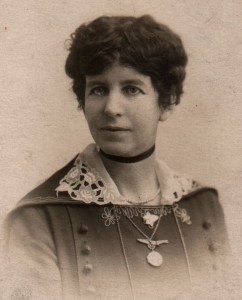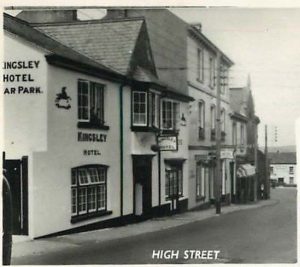
The following anecdote was told to Hugh Richardson by his aunt Beta in the 1940s. Hugh writes:
‘When I was about 12 or 13, my aunt Beta told me a story about a true experience she had in the early days of the Great War, and she had me in stitches. I fell about laughing, but I realise now that a lot of that was because of the way she told the story.
‘At the end of her story, I said “You must write it down, it’s so funny” and unbeknownst to me, she evidently did that, because only in the last year sometime I came across her brief scribbled note, which I have transcribed into type.’
Beta was vague about where these events took place, but noted that the hotel in question was in Devon and was named after a famous Victorian writer – the Charles Kingsley Hotel. Surprisingly enough, a likely location was quite easy to find: a pub, in a town called Northam, now known as the Kingsley Inn. The few details Beta gives about the location seem to match the Kingsley Inn’s location. Now read on …
I was strolling up the sloping High Street of a small town in the South of England (Devon) on a cold winter’s day, when I noticed a woman chasing a man down the street. She caught him and took something out of his hand. When she returned to where I was standing, she showed me a till containing money which the man, having taking ways, had snatched from the bar of her hotel.

She said ‘You see, my place is on fire, and I suppose he thought it was a good opportunity to steal while I was otherwise engaged.’ She went on, ‘Would you be kind enough to go across to the chemist, and ask him to bring over a couple of buckets of water. I have phoned the Fire Brigade, which is about two miles away in the next town. The fire has been smouldering for the last few days and I really should have done something about it, but you know, little things slip your mind.’
I went to the chemist, whose shop was quite close, and he and I went over with the water, when I noticed that two little children were being parked in one of the inside rooms at the hotel. Thinking that they might be forgotten if the fire really got under way, (it was still smouldering then), I took them over to the chemist’s wife for safekeeping, before returning to the scene of the fire, to watch from the pavement on the opposite side of the street.
As all the young men and the horses of the town were away (at the War), several old men dragged the ladders, hoses and other equipment on a truck up to the scene of the fire. They soon put a ladder in position, and one very old man climbed up with a hose and trained it onto the roof, whereupon the water was turned on. As the roof was thatched, a great deal of the water ran off, poured down the sloping gutter and froze, at least that part that didn’t blow over onto my fur coat and turned into icicles. The day had become very windy and much colder than it had been earlier.
As this was going on, many helping hands were rolling barrels of beer and kegs of whisky through the back yard. The landlady, being kind, naturally asked them to help themselves, so that as time went on, the happy people came through to the front, to see how the fire was progressing. By then the fire was well under way, and so were the happy people, because as soon as they stepped onto the icy paving, over they went, one by one – the warming intake inside them meeting the frozen conditions outside and so affecting their balance.
Meanwhile, other willing hands were passing down from the upper storey, bedding, clothing and the like which was taken to the other side of the street – from where it was all very shortly stolen.
Suddenly a plaintive cry was heard at the foot of the ladder – ‘Father, come down, you have done enough. Father, father, come down’. Eventually, with help from those willing hands, he came down the ladder, but on terra firma, found that the hosed water had frozen into the fabric of his clothing and he could not even bend, let alone walk a step. Then someone had an idea and ran to get a wheelbarrow and he was eased into that and wheeled away, his daughter at his side.
Later, when the fire had been doused and as I walked away down the street, I saw a small bunch of neighbours chatting and pointing to me and I heard them whispering – ‘There goes the woman who saved the children. She’s a German.’
Beta Richardson
Very amusing. I wish I’d known her better.
You’d have had to be older … she would have been 140 last year!!!
Yeah, i guess i knew B better, but not that much better – i would have been maybe 6 or 7 when she died.